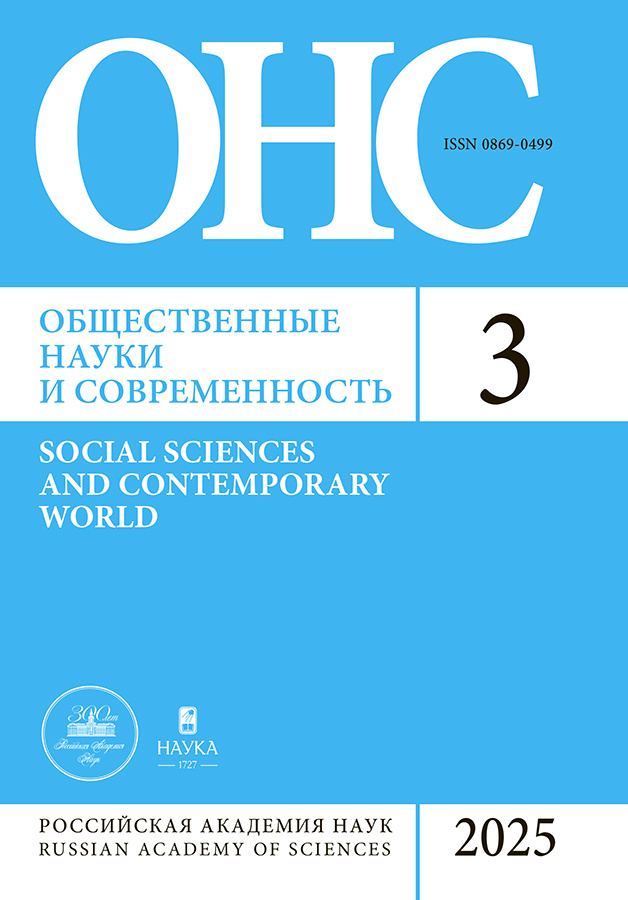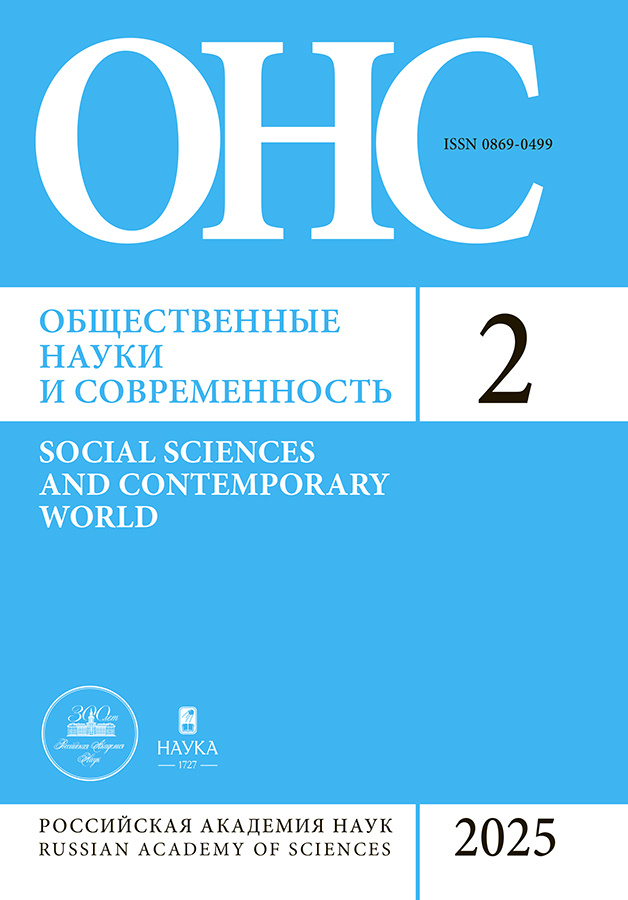Политическая кооптация: концептуальные основы и применимость к российской политике
- Авторы: Горохов А.В.1
-
Учреждения:
- Национальный исследовательский университет «Высшая школа экономики»
- Выпуск: № 2 (2025)
- Страницы: 128–136
- Раздел: Трибуна молодого ученого
- URL: https://cardiosomatics.ru/0869-0499/article/view/687981
- DOI: https://doi.org/10.31857/S0869049925020106
- EDN: https://elibrary.ru/JAYQND
- ID: 687981
Цитировать
Полный текст
Аннотация
Рассмотрены основные подходы к пониманию концепта кооптации, их эволюция, а также возможность применения к анализу российской политики. Исследование призвано обозначить отличительные особенности политической кооптации в российской политике. Установлено, что концепт связан с экономическим и социологическим подходами, выявлены главные черты политической кооптации: восприятие ее через призму взаимодействия элит, негативный и неравный подтекст взаимодействия, использование ее для снижения издержек власти, а также в качестве инструмента анализа политических режимов. Кооптация в российской политике имеет ряд специфических черт, что обусловлено особенностями политической жизни в стране. Среди них – институциональный характер, акцент на системной оппозиции и большое внимание к региональным политическим процессам.
Ключевые слова
Полный текст
Об авторах
Александр Владимирович Горохов
Национальный исследовательский университет «Высшая школа экономики»
Автор, ответственный за переписку.
Email: agorokhov@hse.ru
ORCID iD: 0000-0002-3118-9403
аспирант факультета социальных наук
Россия, 101000, Москва, ул. Мясницкая, д. 20Список литературы
- Панов П.В., Сулимов К.А. (2021) Партия власти и системная оппозиция в Государственной думе: конвергенция публичной риторики // Ars Administrandi (Искусство управления). Т. 13. № 4. С. 516–535. https://doi.org/10.17072/2218-9173-2021-4-516-535/ Panov P., Sulimov K. (2021) The ruling party and the systemic opposition in the State Duma: convergence of public rhetoric. Ars Administrandi, vol. 13, no. 4, pp. 516–535. https://doi.org/10.17072/2218-9173-2021-4-516-535. (In Russ.)
- Туровский Р.Ф. (2007) Центр и регионы: проблемы политических отношений. М.: ГУ ВШЭ. 345 c./Turovsky R. (2007) Centr i regiony: problemy politicheskih otnoshenij [Centre and Regions: Problems of Political Relations]. Moscow: Vishaya shkola economiki. 345 p. (In Russ.)
- Туровский Р.Ф., Сухова М.С. (2021) Кооптация оппозиции в региональных парламентах России: игра с нарушением правил // Полития. № 2 (101). C. 121–143. https://doi.org/10.30570/2078-5089-2021-101-2-121-143/ Turovsky R., Sukhova M. (2021) Cooptation of Opposition in Russian Regional Parliaments: Game That Breaks Rules. Politeia, no. 2, pp. 121–143. https://doi.org/10.30570/2078-5089-2021-101-2-121-143. (In Russ.)
- Allen M.P. (1974). The Structure of Interorganizational Elite Cooptation: Interlocking Corporate Directorates. American Sociological Review, vol. 39, no. 3, pp. 393–406.
- Battilana J., Casciaro T. (2013). Overcoming Resistance to Organizational Change: Strong Ties and Affective Cooptation. Management Science, vol. 59, no. 4, pp. 819–836.
- Bengtsson B., Hertting N. (2014) Generalization by mechanism: Thin rationality and ideal-type analysis in case study research. Philosophy of the Social Sciences, vol. 44, no. 6, pp. 707–732.
- Coy P., Hedeen T. (2005) A stage model of social movement co-optation: Community mediation in the United States. The Sociological Quarterly, vol. 46, no. 3, pp. 405–435.
- Dollbaum J. (2017) Curbing Protest through Elite Co-optation? Regional Protest Mobilization by the Russian Systemic Opposition during the «For Fair Elections» Protests 2011–2012. Journal of Eurasian Studies, vol. 8, no. 2, pp. 109–122.
- Donno D. (2013) Elections and democratization in authoritarian regimes. American Journal of Political Science, vol. 57, no. 3, pp. 703–716.
- Evan W. (1966) The Organization Set: Towards a Theory of Interorganizational Relations. In: Approaches in Organization Design. Ed: Thompson J. Pittsburg: Pittsburg University Press. Pp. 173–191.
- Frantz E., Kendall-Taylor A. (2014). A Dictator’s Toolkit: Understanding How Co-optation affects Repression in Autocracies. Journal of Peace Research, vol. 51, no. 3, pp. 332–346.
- Gandhi J. (2008) Political Institutions under Dictatorship. New York: Cambridge University Press. 256 р.
- Gandhi J., Przeworski A. (2006) Cooperation, Cooptation, and Rebellion under Dictatorships. Economics and Politics, vol. 18, no. 1, pp. 1–26.
- Geddes B. (2005) Why Parties and Elections in Authoritarian Regimes? Annual Meeting of the American Political Science Association. Pp. 456–471.
- Golosov G.V. (2014) Co-optation in the Process of Dominant Party System Building: The Case of Russia. East European Politics, vol. 30, no. 2, pp. 271–285.
- Hathaway W., Meyer D.S. (1993) Competition and Cooperation in Social Movement Coalitions: Lobbying for Peace in the 1980s. Berkeley Journal of Sociology, vol. 38, pp. 157–183.
- Holdo M. (2019) Cooptation and non-cooptation: elite strategies in response to social protest. Social Movement Studies, vol. 18, no. 4, pp. 444–462.
- Kavasoglu B. (2022) Opposition party organizational features, ideological orientations, and elite co-optation in electoral autocracies. Democratization, vol. 29, no. 4, pp. 634–654.
- Lapegna P. (2014) Global Ethnography and Genetically Modified Crops in Argentina: On Adoptions, Resistances, and Adaptations. Journal of Contemporary Ethnography, vol. 43, no. 2, pp. 202–227.
- Malesky E., Schuler P. (2010) Nodding vs Needling: Analyzing Delegate Responsiveness in an Authoritarian Parliament. American Political Science Review, vol. 104, no. 3, pp. 482–502.
- Oyugi W. (2006). Coalition Politics and Coalition Governments in Africa. Journal of Contemporary African Studies, vol. 24, no. 1, pp. 53–79.
- Reuter O.J., Robertson G. (2015) Legislatures, Cooptation, and Social Protest in Contemporary Authoritarian Regimes. The Journal of Politics, vol. 77, no. 1, pp. 235–248.
- Reuter O.J., Turovsky R.F. (2014) Dominant Party Rule and Legislative Leadership in Authoritarian Regimes. Party Politics, vol. 20, pp. 663–674.
- Selznick P. (1949) TVA and the Grass Roots: A Study in the Sociology of Formal Organization. Berkeley and Los Angeles: University of California Press. 274 р.
- Thompson J.D., McEwen W. (1958) Organizational goals and environment: goal-setting as an interaction process. American Sociological Review, vol. 23, pp. 23–31.
- Thompson J.D. (2003) Organizations in Action: Social Science Bases of Administrative Theory. New Jersey: Transaction Publishers. 192 р.
Дополнительные файлы











